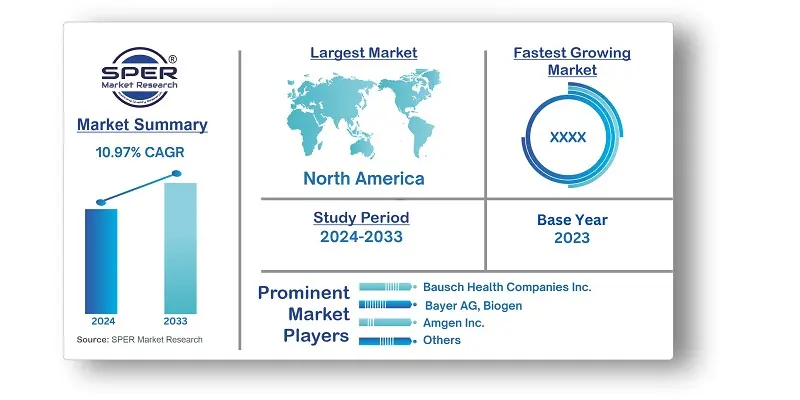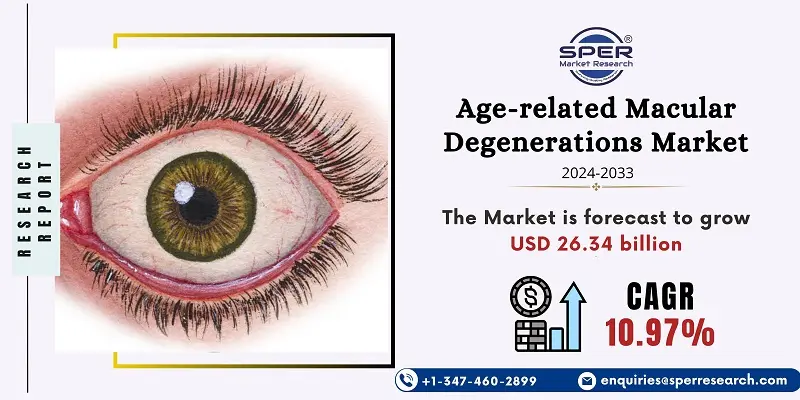
Age-related Macular Degeneration Market Trends, Share, Size, Demand and Future Outlook
Age-related Macular Degeneration Market Growth, Size, Trends Analysis- By Product, By Molecules, By Type of AMD, By Approval Type, By End User- Regional Outlook, Competitive Strategies and Segment Forecast to 2033
| Published: Oct-2024 | Report ID: PHAR2412 | Pages: 1 - 237 | Formats*: |
| Category : Pharmaceutical | |||
- The US Food and Drug Administration (FDA) approved F. Hoffmann-La Roche Ltd.'s Vabysmo (faricimab) 6.0 mg single-dose prefilled syringe (PFS) in 2024 for the treatment of patients with nAMD. These prefilled syringes provide a convenient way to take drugs.
- Iveric Bio is a clinical-phase biotechnology business that creates novel treatments for retinal illnesses. In 2023, Astellas Pharma Inc. (Japan) purchased Iveric Bio. With this purchase, Astella adds the ophthalmologic medication Izervay to its portfolio of pharmaceutical products.


| Report Metric | Details |
| Market size available for years | 2020-2033 |
| Base year considered | 2023 |
| Forecast period | 2024-2033 |
| Segments covered | By Product, By Molecules, By Type of AMD, By Approval Type, By End User |
| Regions covered | North America, Asia-Pacific, Latin America, Middle East & Africa and Europe |
| Companies Covered | Amgen Inc., Bausch Health Companies Inc., Bayer AG, Biogen, F. Hoffmann-La Roche Ltd, Novartis AG, Pfizer Inc., Regeneron Pharmaceuticals Inc., Samsung Bioepis, Others. |
- Ophthalmologists
- Optometrists
- Patients with AMD
- Caregivers
- Healthcare Institutions
- Pharmaceutical Companies
- Medical Device Manufacturers
- Payers and Insurance Providers
- Researchers and Academics
| By Products: | |
| By Molecules: | |
| By Type of AMD: | |
| By Approval Type: | |
| By End User: |
- Global Age-related Macular Degeneration Market Size (FY’2024-FY’2033)
- Overview of Global Age-related Macular Degeneration Market
- Segmentation of Global Age-related Macular Degeneration Market By Products (Lucentis, Eylea & Eylea HD, Vabysmo, Sofovre, Others)
- Segmentation of Global Age-related Macular Degeneration Market By Molecules Technology (Ranibizumab, Aflibercept, Faricimab, Pegcetoplan, Others)
- Segmentation of Global Age-related Macular Degeneration Market By Type of AMD (Wet AMD, Dry AMD)
- Segmentation of Global Age-related Macular Degeneration Market By Approval Type (Biologic, Biosimilar)
- Segmentation of Global Age-related Macular Degeneration Market By End User (Hospitals, Specialty Centers, Long-Term Care Facilities)
- Statistical Snap of Global Age-related Macular Degeneration Market
- Expansion Analysis of Global Age-related Macular Degeneration Market
- Problems and Obstacles in Global Age-related Macular Degeneration Market
- Competitive Landscape in the Global Age-related Macular Degeneration Market
- Impact of COVID-19 and Demonetization on Global Age-related Macular Degeneration Market
- Details on Current Investment in Global Age-related Macular Degeneration Market
- Competitive Analysis of Global Age-related Macular Degeneration Market
- Prominent Players in the Global Age-related Macular Degeneration Market
- SWOT Analysis of Global Age-related Macular Degeneration Market
- Global Age-related Macular Degeneration Market Future Outlook and Projections (FY’2024-FY’2033)
- Recommendations from Analyst
1.1. Scope of the report1.2. Market segment analysis
2.1. Research data source2.1.1. Secondary Data2.1.2. Primary Data2.1.3. SPER’s internal database2.1.4. Premium insight from KOL’s2.2. Market size estimation2.2.1. Top-down and Bottom-up approach2.3. Data triangulation
4.1. Driver, Restraint, Opportunity and Challenges analysis4.1.1. Drivers4.1.2. Restraints4.1.3. Opportunities4.1.4. Challenges4.2. COVID-19 Impacts of the Global Age-related Macular Degeneration Market.
5.1. SWOT Analysis5.1.1. Strengths5.1.2. Weaknesses5.1.3. Opportunities5.1.4. Threats5.2. PESTEL Analysis5.2.1. Political Landscape5.2.2. Economic Landscape5.2.3. Social Landscape5.2.4. Technological Landscape5.2.5. Environmental Landscape5.2.6. Legal Landscape5.3. PORTER’s Five Forces5.3.1. Bargaining power of suppliers5.3.2. Bargaining power of buyers5.3.3. Threat of Substitute5.3.4. Threat of new entrant5.3.5. Competitive rivalry5.4. Heat Map Analysis
6.1. Global Age-related Macular Degeneration Market Manufacturing Base Distribution, Sales Area, Product Type6.2. Mergers & Acquisitions, Partnerships, Product Launch, and Collaboration in Global Age-related Macular Degeneration Market
7.1. Global Age-related Macular Degeneration Market Size, Share and Forecast, By Products, 2020-20267.2. Global Age-related Macular Degeneration Market Size, Share and Forecast, By Products, 2027-20337.3. Lucentis7.4. Eylea & Eylea HD7.5. Vabysmo7.6. Sofovre7.7. Others
8.1. Global Age-related Macular Degeneration Market Size, Share and Forecast, By Molecules, 2020-20268.2. Global Age-related Macular Degeneration Market Size, Share and Forecast, By Molecules, 2027-20338.3. Ranibizumab8.4. Aflibercept8.5. Faricimab8.6. Pegcetoplan8.7. Others
9.1. Global Age-related Macular Degeneration Market Size, Share and Forecast, By Type of AMD, 2020-20269.2. Global Age-related Macular Degeneration Market Size, Share and Forecast, By Type of AMD, 2027-20339.3. Wet AMD9.4. Dry AMD
10.1. Global Age-related Macular Degeneration Market Size, Share and Forecast, By Approval Type, 2020-202610.2. Global Age-related Macular Degeneration Market Size, Share and Forecast, By Approval Type, 2027-203310.3. Biologic10.4. Biosimilar
11.1. Global Age-related Macular Degeneration Market Size, Share and Forecast, By End User, 2020-202611.2. Global Age-related Macular Degeneration Market Size, Share and Forecast, By End User, 2027-203311.3. Hospitals11.4. Specialty Centers11.5. Long-Term Care Facilities
12.1. Global Age-related Macular Degeneration Market Size and Market Share
13.1. Global Age-related Macular Degeneration Market Size and Market Share By Region (2020-2026)13.2. Global Age-related Macular Degeneration Market Size and Market Share By Region (2027-2033)13.3. Asia-Pacific13.3.1. Australia13.3.2. China13.3.3. India13.3.4. Japan13.3.5. South Korea13.3.6. Rest of Asia-Pacific13.4. Europe13.4.1. France13.4.2. Germany13.4.3. Italy13.4.4. Spain13.4.5. United Kingdom13.4.6. Rest of Europe13.5. Middle East and Africa13.5.1. Kingdom of Saudi Arabia13.5.2. United Arab Emirates13.5.3. Qatar13.5.4. South Africa13.5.5. Egypt13.5.6. Morocco13.5.7. Nigeria13.5.8. Rest of Middle-East and Africa13.6. North America13.6.1. Canada13.6.2. Mexico13.6.3. United States13.7. Latin America13.7.1. Argentina13.7.2. Brazil13.7.3. Rest of Latin America
14.1. Amgen Inc.14.1.1. Company details14.1.2. Financial outlook14.1.3. Product summary14.1.4. Recent developments14.2. Bausch Health Companies Inc.14.2.1. Company details14.2.2. Financial outlook14.2.3. Product summary14.2.4. Recent developments14.3. Bayer AG14.3.1. Company details14.3.2. Financial outlook14.3.3. Product summary14.3.4. Recent developments14.4. Biogen14.4.1. Company details14.4.2. Financial outlook14.4.3. Product summary14.4.4. Recent developments14.5. F. Hoffmann-La Roche Ltd14.5.1. Company details14.5.2. Financial outlook14.5.3. Product summary14.5.4. Recent developments14.6. Novartis AG14.6.1. Company details14.6.2. Financial outlook14.6.3. Product summary14.6.4. Recent developments14.7. Pfizer Inc.14.7.1. Company details14.7.2. Financial outlook14.7.3. Product summary14.7.4. Recent developments14.8. Regeneron Pharmaceuticals Inc.14.8.1. Company details14.8.2. Financial outlook14.8.3. Product summary14.8.4. Recent developments14.9. Samsung Bioepis14.9.1. Company details14.9.2. Financial outlook14.9.3. Product summary14.9.4. Recent developments14.10. Others
SPER Market Research’s methodology uses great emphasis on primary research to ensure that the market intelligence insights are up to date, reliable and accurate. Primary interviews are done with players involved in each phase of a supply chain to analyze the market forecasting. The secondary research method is used to help you fully understand how the future markets and the spending patterns look likes.
The report is based on in-depth qualitative and quantitative analysis of the Product Market. The quantitative analysis involves the application of various projection and sampling techniques. The qualitative analysis involves primary interviews, surveys, and vendor briefings. The data gathered as a result of these processes are validated through experts opinion. Our research methodology entails an ideal mixture of primary and secondary initiatives.



Frequently Asked Questions About This Report
PLACE AN ORDER
Year End Discount
Sample Report
Pre-Purchase Inquiry
NEED CUSTOMIZATION?
Request CustomizationCALL OR EMAIL US
100% Secure Payment






Related Reports
Our Global Clients
Our data-driven insights have influenced the strategy of 200+ reputed companies across the globe.






















